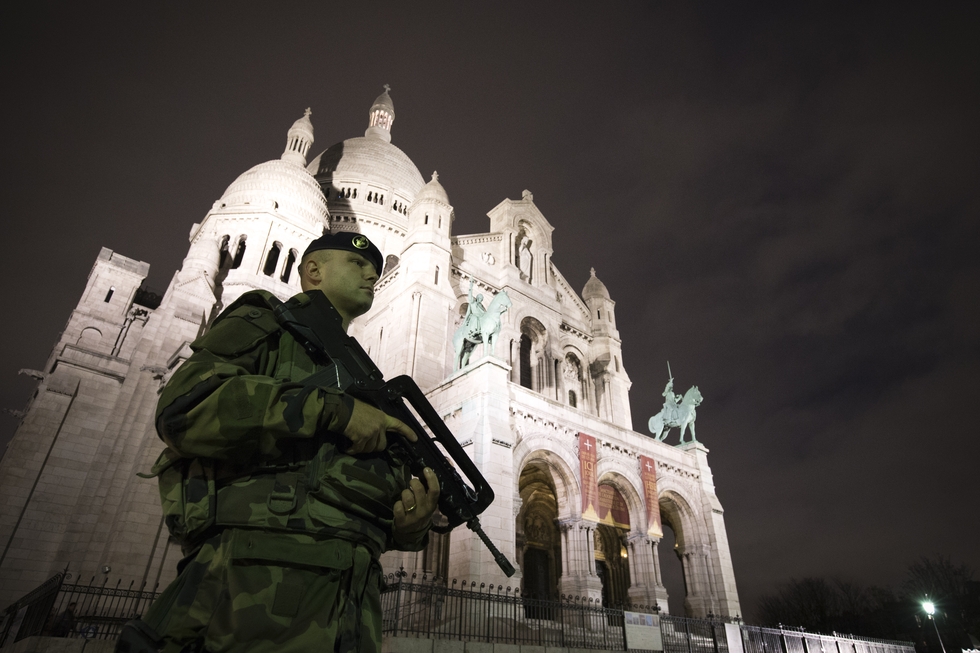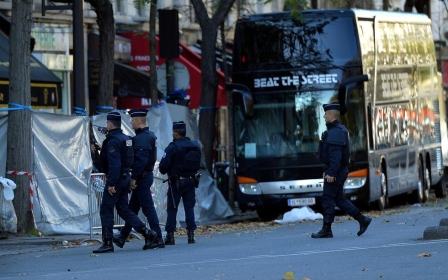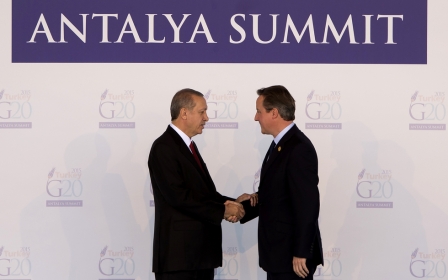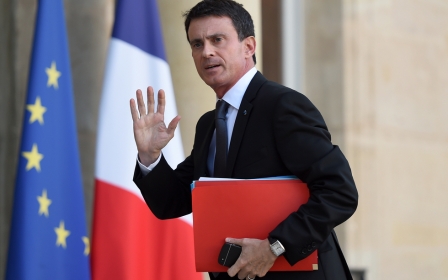Paris attacks are not about 'our way of life'

Were the attacks in Paris by the terrorist group Daesh an attack on the grandiose concept of "Western civilization" as commentator Iain Martin described them? "A war on fun" to quote Rafia Zakaria? Much ink has been spilled examining what can be dubbed the "cultural" explanations for Daesh’s more recent murderous campaign – the "why do they hate us" narrative which provides convenient binaries, and locates the source of violence in the intangible – in ideas – making them seem unconnected to real-world events or ultimately, to the political motivations underpinning acts of terrorism.
The reality is that terrorist groups are motivated by political ends, not simply by a subversive narrative of cultural clashes and ideological supremacy, though those are typically also present as the ideational packaging of their demands.
Rather than asking what is it about "us" that has made countries across the globe targets of Daesh violence, the question should be what are Daesh seeking to achieve through such violence. And this is where it is vital to connect the dots.
What do the downing of a Russian-operated airline in the Sinai, the bombing of a Beirut suburb, an Ankara peace march, a suicide attack on a funeral in Baghdad and coordinated assaults in Paris on Friday, all have in common?
The answer is they are all recent responses to Daesh’s military setbacks in Syria and Iraq, where it has been losing territory and has been under intensified bombing by both the US-led coalition, which includes France, and by Russia.
The twin suicide bombings in Lebanon last week which killed 41 people can and should be linked to a response by Daesh to Hezbollah's offensives in Syria, which have intensified in the past month, after the group lost one of its senior commanders in fighting there.
In Baghdad, 26 people were killed and scores injured when the funeral of a Shia fighter killed in a battle against Daesh was targeted by the group. Russia - whose airline was downed in Egypt this month - has become a target in Daesh propaganda for its bombing campaign against the group (as well as, more controversially, Syrian rebels allied with coalition forces). In one online video, the group threatens Russia for its aerial campaign, claiming it will bring down the Kremlin.
And in September, France announced that it would begin bombing Daesh in Syria, with French air strikes doing substantial damage in Raqqa and its hinterlands, as well as targeting Daesh’s oil infrastructure, a source of much of its budget. These actions, as well as bombings of Daesh in Iraq, lie behind the group’s most recent offensives against targets from the Middle East to Europe – connected by a common offensive against Daesh’s land grabs – and much less by some reductive notion of an attack on "bon vivant" culture.
As reports emerge that Daesh has released a new video threatening attacks against countries involved in air strikes against the group, the motivation behind the attacks becomes more apparent. As Camille Grand, director of the Foundation fo Strategic Research, a Paris-based defence and security think tank is quoted as saying in the Wall Street Journal, "Islamic State is on the defensive and so it is shifting toward terrorist activity."
Certainly, the "soft" targets chosen were designed to strike fear by rendering the most mundane of places – a café, a concert hall, a football stadium – sites of fear and death. But the political objective of terror is rarely a mere critique of cultural mores, it’s far more than a bloody comment on "our values" or an attempt to crush "our way of life". It’s a political statement and a not particularly veiled one.
In a video released by Daesh’s foreign propaganda arm, the Al-Hayat Media Centre, the group affirmed that while coalition forces continue bombing their positions, they will "never be safe". And choosing busy, bustling, crowded locations, with a particular symbolic significance is at the heart of terrorist strategies. As the academic Mark Juergensmeyer notes in his book Terror in the Mind of God: The Global Rise of Religious Violence, "Acts of religious terror serve not only as tactics in a political strategy but also as evocations of a much larger spiritual confrontation."
Daesh’s focus has long been creating a state in Syria and Iraq, as opposed to attacking Western targets per se, which is adopted by their ideological counterparts Al-Qaida. But Daesh’s recent Paris attacks, as well as its coordination with Al-Qaida in the case of the Charlie Hebdo attack, suggests the distinction between the two group’s priorities may be blurring as interventions against the group’s appropriation of territory leads it to ever more direct confrontation.
France wasn’t attacked because it is the country of liberte egalite fraternity - though clearly Daesh is ideologically opposed to democracy and what it dubs "man-made laws" and has little regard for what it dubs the "capital of abomination and perversion". Rather, it was targeted because France has committed to an aerial campaign against the group, which views such actions as placing it at "war" with France. Language coming out of the Elysee echoing this will reinforce that perception.
France is also an easy target for Daesh’s propaganda, which capitalises on restrictions on freedom of religion in France as fodder for its appeal, pointing to the ban on face veils in its videos and arguing that Muslims can’t live as practitioners of their faith in a country where Muslim practices are often the object of political wrangling.
France had already been a target of several smaller-scale attacks earlier this year, ideologically linked to Daesh. "You attack the caliphate or you attack Daesh, we’ll attack you," Amedy Coulibaly, the gunman who targeted the Kosher grocery store in January, can be heard saying in his posthumous video after his attack, coordinated with that on the Charlie Hebdo offices, in which a total of 18 people were killed. These attacks - the thwarted gunman on a packed Thalys train, a beheading in the south of France – reflect the call emitted by Daesh for sympathisers unable to undertake the journey to Syria, to commit acts of individual terror, clearly stated in a 2014 video by the group. But the scope and ambition of Friday’s attack reflects an upping of the ante – a clear message that the fight will be brought from Syria to those nations who challenge Daesh’s expansion.
Narratives of apocalyptic cosmic clashes between good and evil, with the West portrayed as the bastion of moral supremacy under siege from a regressive religious other, are tempting in moments of grief and disarray. But ultimately, they play into the very same Manichean narratives advocated by the terrorists. The truth is far more prosaic. Countries which threaten Daesh’s territorial gains have been and will continue to be – according to the group itself – targets for its attacks. Addressing the viability of a future Syrian state, countering the group on the ground and addressing the roots of disaffection among a small – but dangerous - minority of radicalised European Muslims is the only way forward.
The fact of global interconnectedness has never been starker – both through the refugee crisis and the threat of Daesh, Europe is faced with the reality that blowback from actions in the Middle East cannot be contained and that European security is now contingent on finding a solution to the Syrian crisis. It has taken bombs on the streets of "gay Paris" for European leaders to realise that the fate of Syrians is inextricably linked to our own.
- Myriam Francois-Cerrah is a Franco-British journalist, broadcaster and writer with a focus on current affairs, France and the Middle East.
The views expressed in this article belong to the author and do not necessarily reflect the editorial policy of Middle East Eye.
Photo: A French soldier enforcing the Vigipirate plan, France's national security alert system, patrols in front of the Sacre Coeur Basilica on 16 November, 2015 in Paris (AFP).
New MEE newsletter: Jerusalem Dispatch
Sign up to get the latest insights and analysis on Israel-Palestine, alongside Turkey Unpacked and other MEE newsletters
Middle East Eye delivers independent and unrivalled coverage and analysis of the Middle East, North Africa and beyond. To learn more about republishing this content and the associated fees, please fill out this form. More about MEE can be found here.





